
In 2024, How To Track IMEI Number Of OnePlus Open Through Google Earth?

How To Track IMEI Number Of OnePlus Open Through Google Earth?
When losing your phone, having a reliable tool at your fingertips can make all the difference. That tool is IMEI tracking, your secret weapon for locating your lost or stolen device. IMEI is a unique number that every mobile device possesses. It’s like a fingerprint for your phone.
Now, the question is, is it possible to track an IMEI number through Google Earth? This question has sparked much debate on the internet, so this article aims to find it out. Keep reading and learn the secrets of Google Earth IMEI trackers.
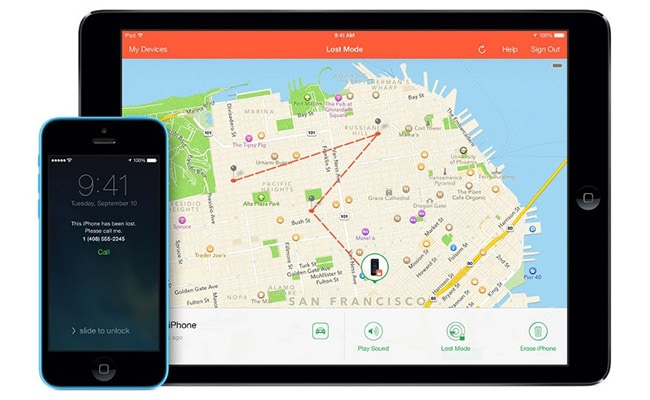
Part 1: How To Track Your OnePlus Open on Google Earth
This Google Maps IMEI number tracking issue has caused quite a buzz and controversy on the internet. It has raised many concerns regarding the safety and privacy of every smartphone user. To tell you the truth, Google Earth lacks IMEI location data and does not provide such capabilities. Thus, there is no truth in tracking IMEI numbers through Google Earth.
However, if you have access to a cell phone’s GPS coordinates or the location of a cell tower to which it is linked, you can use Google Earth to follow its location.
How To Locate a Smartphone Using Google Earth
Many current smartphones include GPS receivers that allow them to pinpoint their exact location. If you know the phone’s GPS coordinates, you can plug them into Google Earth to see where it is on the map.
- Step 1: This process won’t be possible if your location services are not enabled on your phone. To do this, navigate to Settings, then Location on Android, and Settings > Privacy > Location Services on iOS.
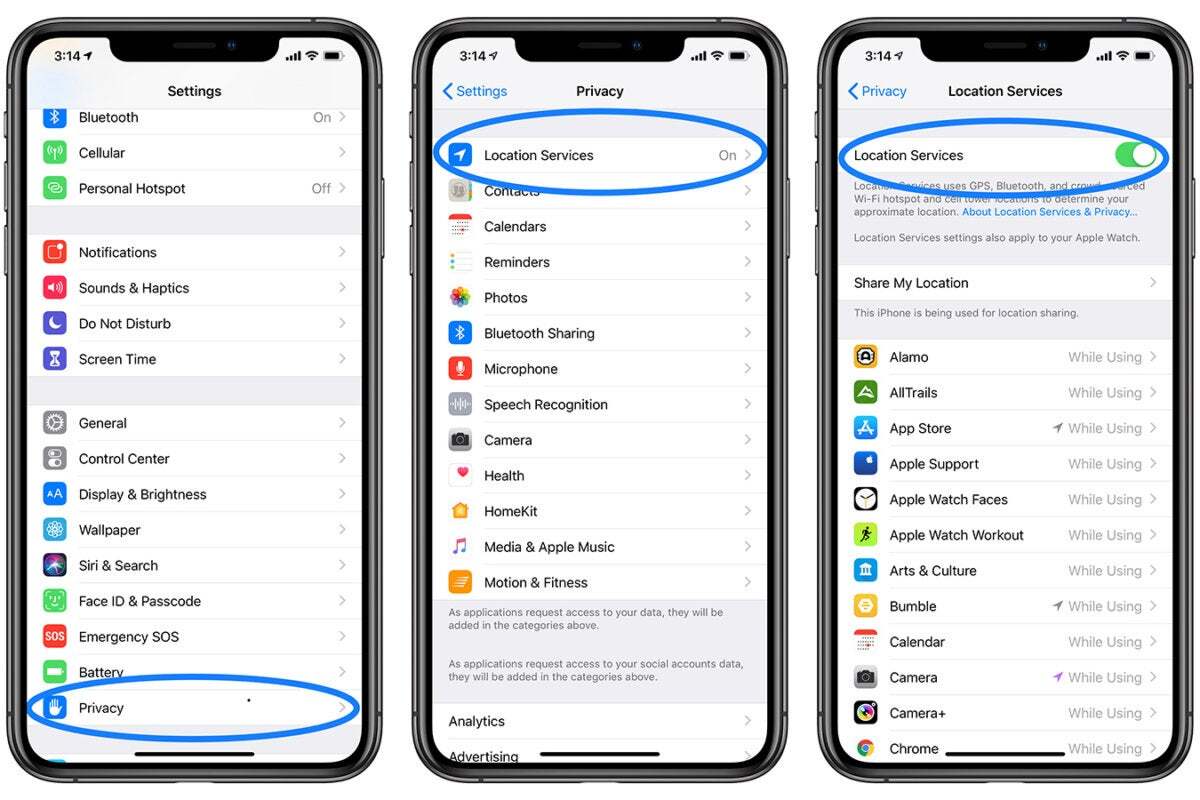
- Step 2: Google Earth can be downloaded and installed on your computer or mobile device. It works with Windows, macOS, Android, and iOS. Download it from your device’s Google Earth website or the app store.
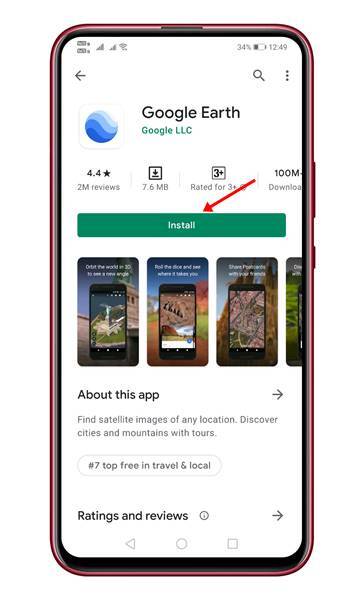
- Step 3: Sign in to Google Earth using the Google Account linked to the phone you want to track. This step is required to acquire location data and monitor IMEI numbers using Google Earth.
- Step 4: Launch Google Earth on your computer or mobile device, then select Your timeline from the Google Maps menu. The operation will take you to the Google Maps Timeline page.
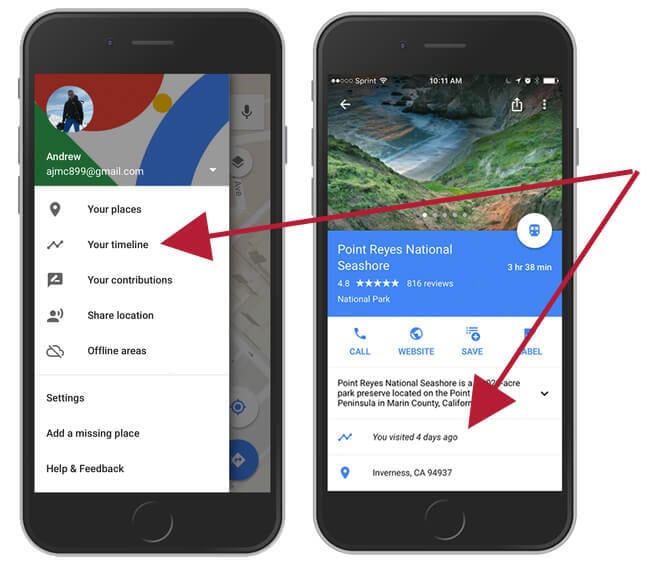
- Step 5: Select the day you wish to see the phone’s location history. Choose the OnePlus Open device you want to track from the dropdown menu if you have numerous devices linked to the same account. The timeline displays the selected device’s location history for the set date. Examine the locations visited, the routes taken, and the time spent at each spot. For further information, select a certain location or time.
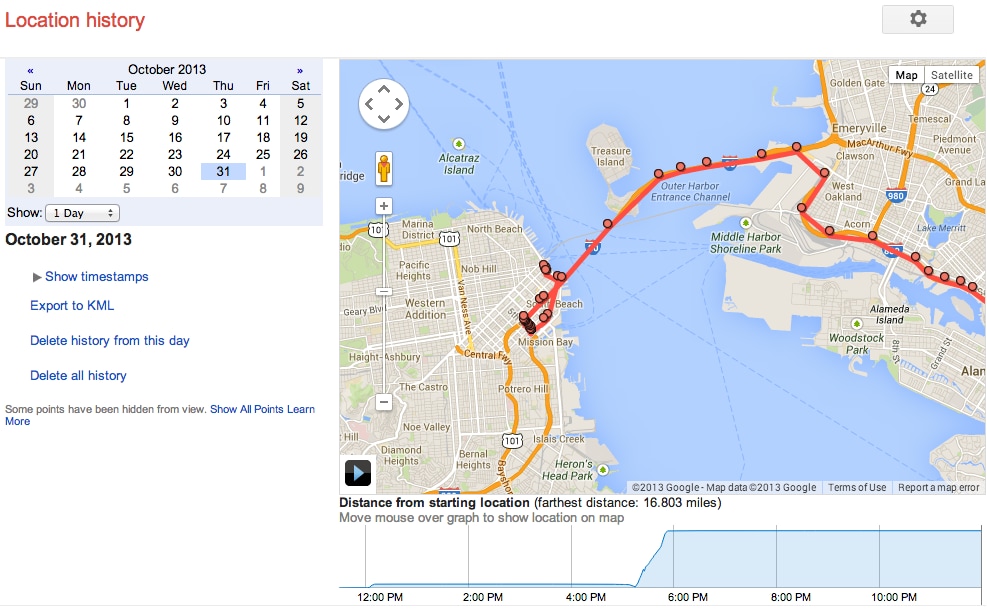
Note: Google Earth does not support real-time location tracking by default. You can use the Find My Device function on Android or Find My on iOS instead if you want to track your phone’s real-time location.
Part 2: Google Earth Alternatives: Track Phone Using IMEI Number
Now that you know the truth behind tracking an IMEI number through Google Earth, let’s talk about other ways to track your phone using your IMEI number. This section will discuss some of your other options when it comes to IMEI number location tracking.
Method 1: Using a Third-Party App
If you have the IMEI number of the stolen device, you can track the phone using IMEI for free utilizing various tools available online.
- Step 1: In the app store, search for “IMEI tracker” and download the IMEI tracking app you wish to install on your phone.
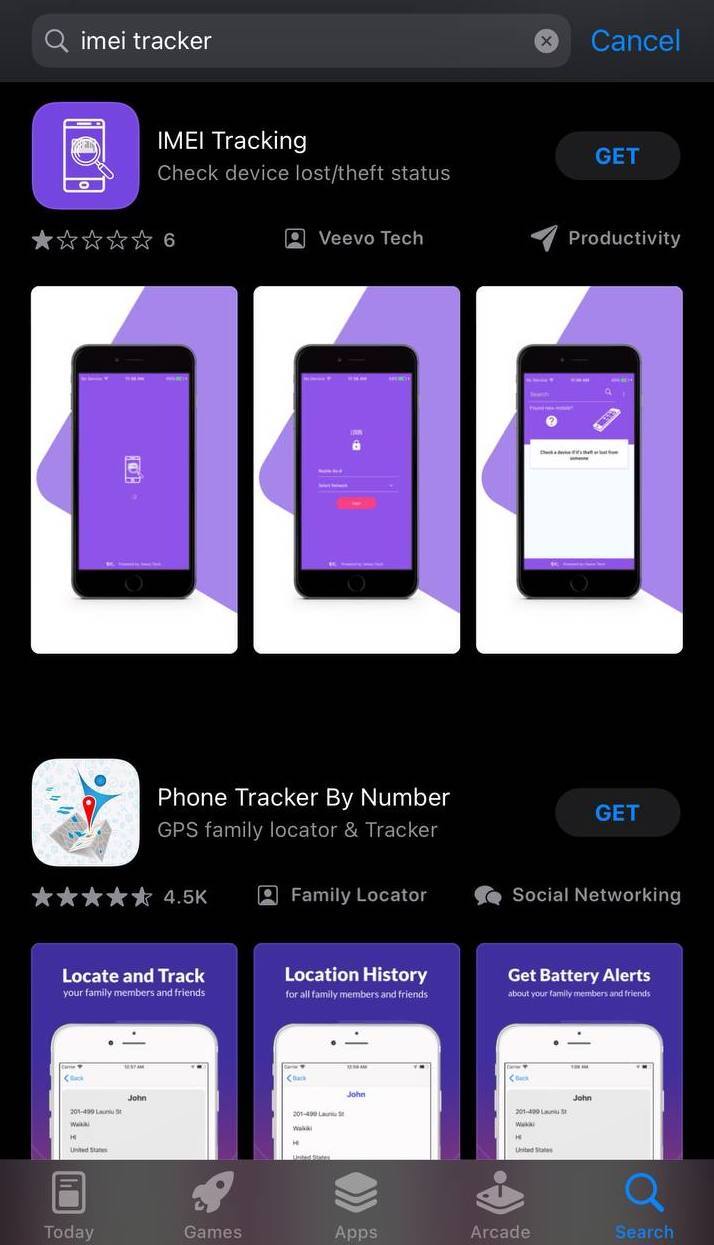
- Step 2: Open the app and follow the in-app guide on how to use it.
Note: Most of the apps require authorization access to your phone. Some also provide a feature where you may send an SMS or a command to get the lost phone’s location.
Method 2: Online IMEI Tracking
In certain situations, an online platform is preferable to a mobile app. For your convenience, a free online platform for tracking a phone using its IMEI number is featured below:
IMEI TRACKER
The online IMEI TRACKER is simple to use. After searching an IMEI tracker in Google and opening its website, please enter a valid IMEI code in its search bar and specify the country where your cell phone was first registered. After that, you have to wait for a few moments, and then you may view the phone’s location status and determine whether it is lost or stolen.
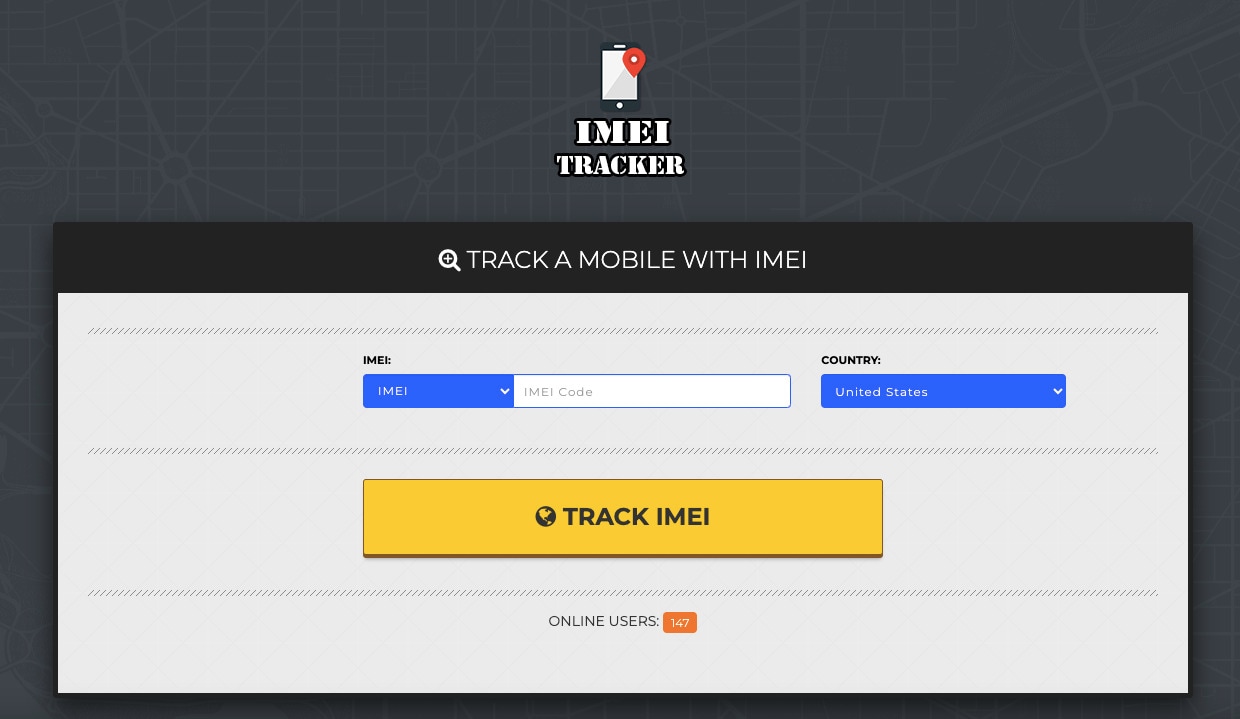
Pros and Cons of IMEI Trackers: Apps and Online Platforms
Now that you know there are still methods to track a phone using an IMEI number, it’s also important to weigh their pros and cons. See the list presented below:
Pros
Check out the advantages of using IMEI trackers below:
- **Lost or Stolen Device Recovery.**The primary benefit of an IMEI tracker is its ability to help locate a lost or stolen mobile device. That can be crucial for recovering your valuable device.
- **No Need for Special Apps.**Unlike many other tracking methods, IMEI tracking doesn’t require any special apps or software to be installed on the OnePlus Open device you want to track. It relies on the unique IMEI number of the OnePlus Open device.
- IMEI Tracker is compatible with many mobile devices, including smartphones and feature phones. It’s not limited to a specific operating system or brand.
Cons
Below are the drawbacks of using IMEI trackers:
- **Privacy Concerns.**IMEI tracking can raise privacy concerns, as it involves tracking the location of a mobile device. It’s essential to use this technology responsibly and only for legitimate purposes.
- **Internet and Network Dependency.**IMEI tracking depends on the OnePlus Open device being connected to the internet or a mobile network. If the OnePlus Open device is turned off, in airplane mode, or disconnected, tracking may be impossible.
- **Inaccuracies in Remote Areas.**IMEI tracking can be less accurate or even unavailable in remote or rural areas with poor network coverage.
In summary, an IMEI tracker can be a valuable tool for locating lost or stolen mobile devices with its location accuracy and compatibility with various devices. However, it comes with limitations related to privacy and network dependency.
Bonus: An Effective Method for Other iPhone Issues Like Locked Screens
In the previous sections, this article delved into IMEI tracking, which helps you accurately locate your lost or stolen phone. However, imagine this scenario: you’ve found your long-lost iPhone, but there’s a problem. You can’t remember the password, PIN, or pattern to unlock it. So this time, let’s go over one of the most common issues smartphone owners encounter: being locked out of their devices.
Introducing Wondershare Dr.Fone – Screen Unlock (iOS): Your iPhone Savior
There are numerous scenarios where one may forget the passcode on their iOS device. While many people dismiss their phones as useless, there are ways to unlock iPhones correctly. And that’s where Dr.Fone - Screen Unlock (iOS) comes to the rescue. It’s like the locksmith for your phone’s digital lock.
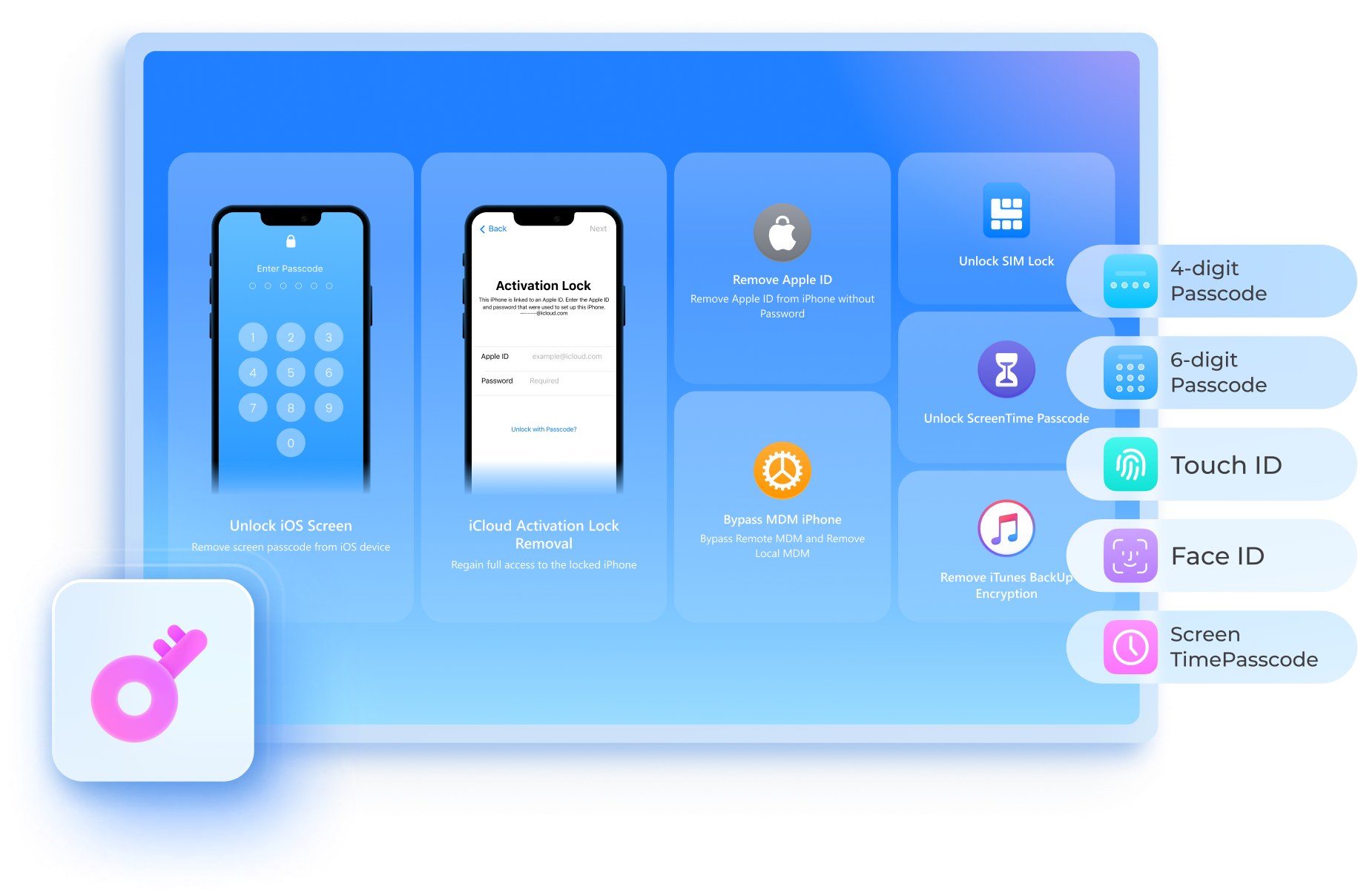
Why Dr.Fone - Screen Unlock Is Your Go-To Solution
Let’s discuss why Dr.Fone - Screen Unlock is a game-changer in unlocking phone, especially when using your IMEI number.
- **User-Friendly Interface.**Fone - Screen Unlock boasts an interface designed with you in mind. You don’t need to be a tech guru to use it. The steps are straightforward, making the whole process hassle-free.
- **Wide Compatibility.**One of the best things about Dr.Fone - Screen Unlock is its compatibility with various mobile devices. It doesn’t matter if you’re using an Android or iOS device; this tool has you covered. It’s like having a universal key to open many locks.
- **Safe and Secure.**Security is a top priority when it comes to your phone. Dr.Fone - Screen Unlock ensures that your data remains safe during unlocking. Your personal information won’t be compromised.
Step-by-Step Guide
Now, let’s dive into how to use Dr.Fone - Screen Unlock to unlock your phone easily :
- Step 1: After downloading and installing Wondershare Dr.Fone on your PC, click Toolbox, click Screen Unlock, then choose iOS. In the window that appears, click the Unlock iOS Screen button.
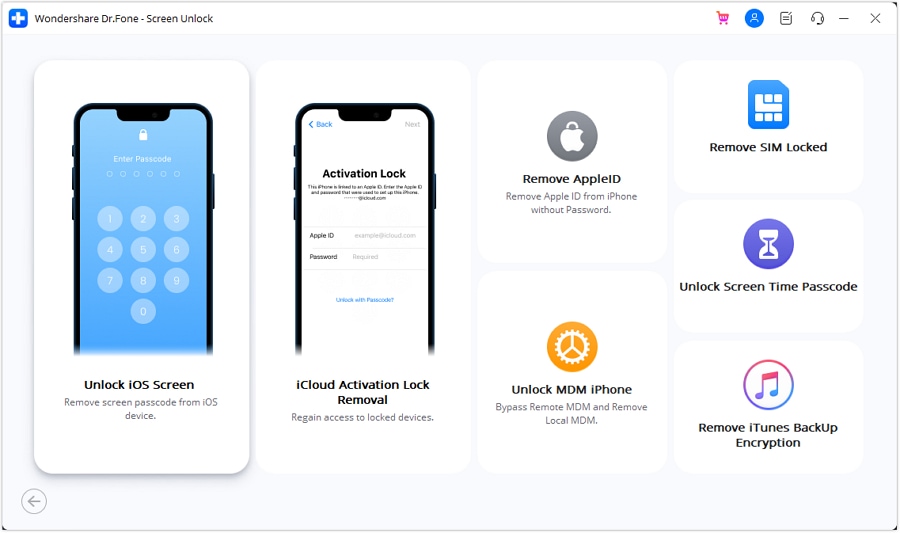
- Step 2: On the next screen, select Start to begin the unlocking procedure for the iOS device. Make sure that your device’s battery levels are enough.
- Step 3: After that, you should set your iDevice into Recovery Mode. Follow the on-screen instructions to put your iDevice into the appropriate mode for your model. If Recovery Mode does not work, click the Try DFU Mode button at the bottom to access the instructions for entering the iDevice into DFU mode.
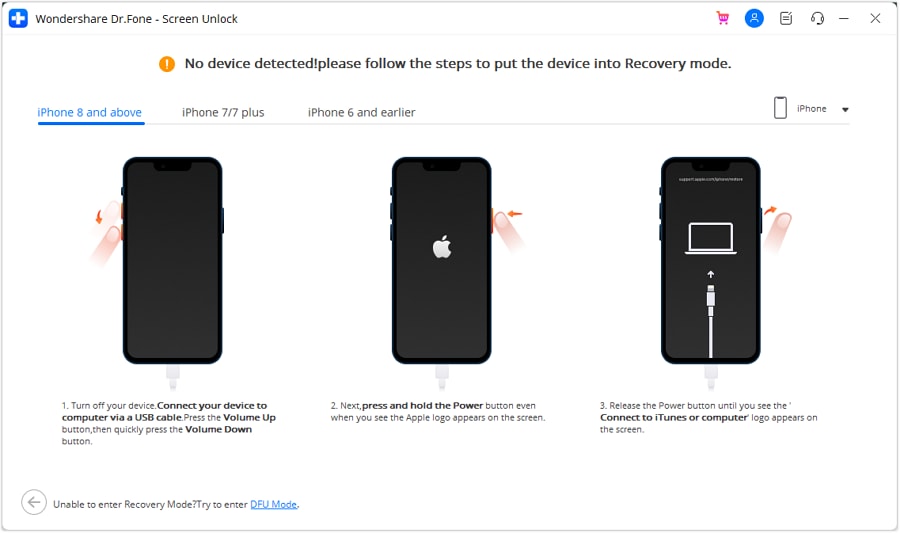
- Step 4: After the user successfully enters their iDevice into Recovery Mode, the platform automatically recognizes the Device Model and shows it in the appropriate section. Modify the model and select the System Version to meet your needs if necessary. After that, select Start to begin unlocking your device’s screen.
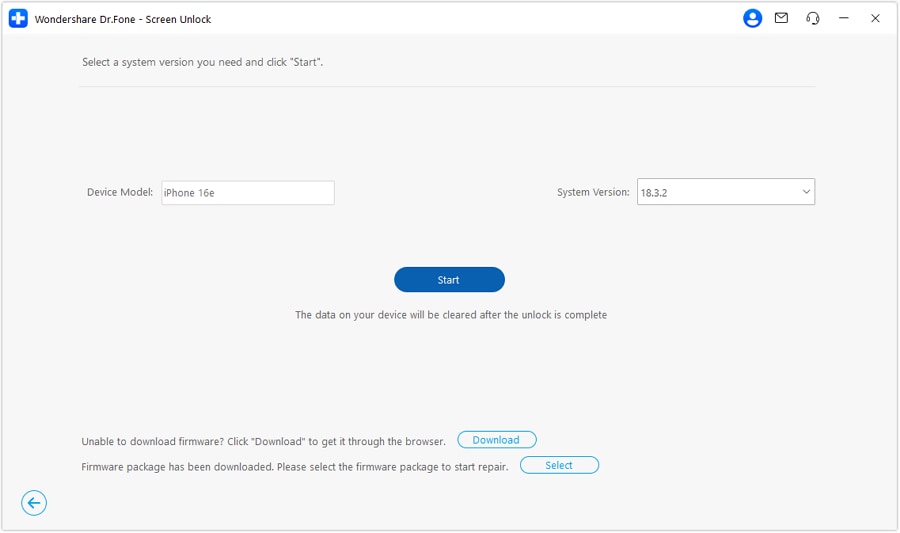
- Step 5: The following screen reveals the status of the iOS firmware download on the platform. If you want to stop the procedure, click the Stop button. In cases when the iOS firmware is downloading slowly on the platform, utilize the Copy button to copy the URL for manually downloading the iOS firmware.
- Step 6: After successfully downloading the iOS firmware, it is confirmed and displayed on the next screen. Continue by clicking the Unlock Now button to begin the unlocking procedure.
- Step 7: A prompt window displays on the screen, asking for procedure confirmation. Enter the indicated code and tap Unlock to proceed with the final result.
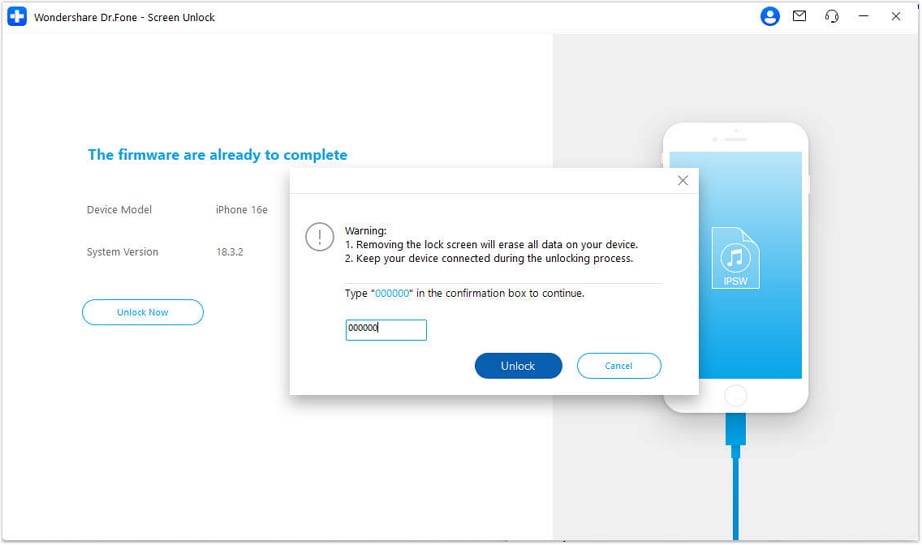
- Step 8: The next screen displays the unlocking iOS device’s progress bar. Keep in mind that the OnePlus Open device must be connected at all times; otherwise, it will brick.
- Step 9: Once the iDevice has been successfully unlocked, click the Done button to complete the process. If your iDevice is still locked, click Try Again to restart the process.
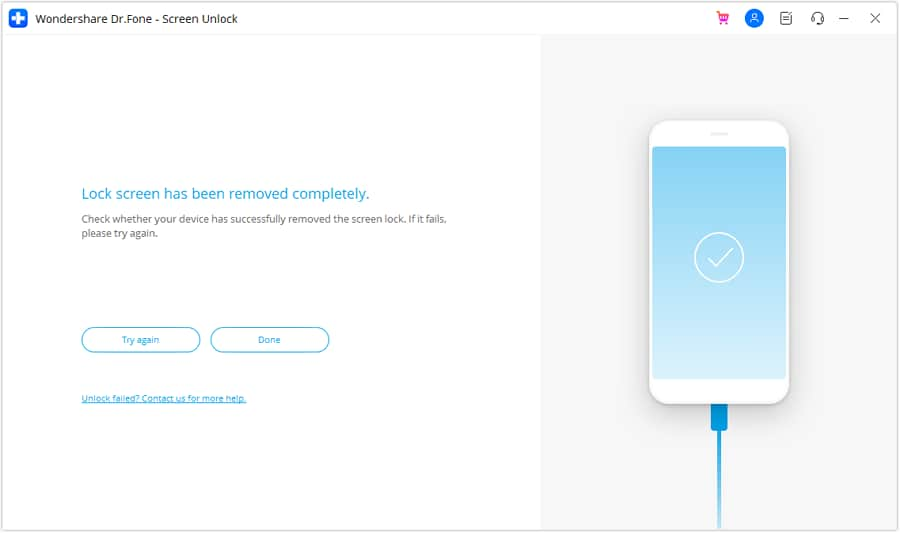
Conclusion
This article explored the incredible world of IMEI tracking, a powerful tool for locating lost or stolen phones. You’ve learned that your IMEI number is capable of helping you pinpoint your device’s location, but tracking IMEI numbers through Google Earth is impossible.
But that’s not all. This article also introduced and divulged an amazing and reliable tool for unlocking an iPhone. So, the next time you’re in a tight spot with a locked screen, remember that Dr.Fone - Screen Unlock (iOS) is the best software you should get your hands on.
Top 12 Prominent OnePlus Open Fingerprint Not Working Solutions
Part 1. Optimal Solution: Unlock With Wondershare Dr.Fone Directly
Facing a malfunctioning fingerprint on your OnePlus Open can be frustrating. In this scenario, the most effective resolution is the removal of the registered fingerprint. Yet, traditional methods of removing the fingerprint can be difficult and pose security risks. In this case, going for tools like Wondershare Dr.Fone is the best choice. This tool ensures your Pixel device is at no risk.
Dr.Fone offers a swift solution to remove the Android lock screen in five minutes. It effectively removes 4 types of screen locks. These include patterns, PINs, passwords, and fingerprints. Dr.Fone can bypass the Android FRP lock without needing a PIN or Google account. It ensures accessibility to the Android device without such credentials.

Dr.Fone - Screen Unlock (Android)
The Best UnlockJunky Alternative to Bypass FRP and Solve Your Screen Locks
- Remove all Android screen locks (PIN/pattern/fingerprints/face ID) in minutes.
- Bypass the FRP lock of Samsung without a PIN or Google account.
- Everyone can handle the lock screen without any tech knowledge.
- Provide specific removal solutions to promise good success rate.
4,008,672 people have downloaded it
Prominent Features of Wondershare Dr.Fone
- FRP bypass is enabled for brands like Samsung, Xiaomi, Redmi, Oppo, Realme , and Vivo.
- With Dr.Fone, bypassing screen locks can be achieved without data loss.
- Fone supports 2000+ Android phones and tablets from over 18 brands for screen unlocking.
Step-by-Step Guide To Remove Fingerprint Type Lock on Google Pixel Using Dr.Fone
With Dr.Fone, you can resolve the OnePlus Open fingerprint sensor not working issue within minutes. Below is a detailed walkthrough for removing a fingerprint lock on a Google Pixel:
- Step 1: Connecting and Accessing Screen Unlock Feature on Dr.Fone
Open Wondershare Dr.Fone and connect your Android device via a USB cable. Once the connection is established, navigate to the “Toolbox” tab and choose “Screen Unlock.” Upon reaching the new screen, choose the “Android” option. Then, select “Unlock Android Screen” from the options on the following screen.
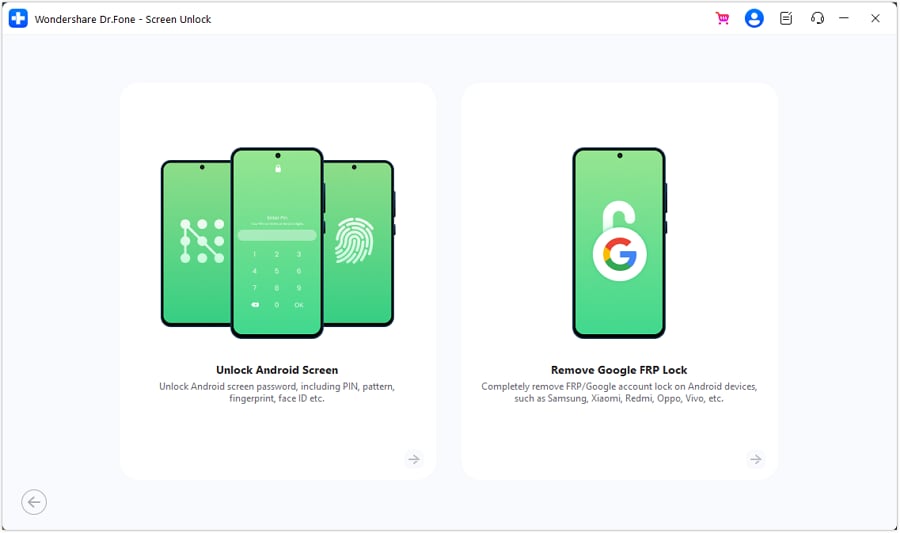
- Step 2: Selecting Google As the OnePlus Open device Brand and Activating Recovery Mode
Afterward, you’ll be guided to a subsequent screen prompting you to choose the OnePlus Open device brand, Google. Once you select the brand, you’ll be directed to enter a specific mode corresponding to it. For Google Pixel Devices, the specific mode to enter is Recovery Mode. Simply follow the on-screen instructions to activate Recovery Mode on your device.
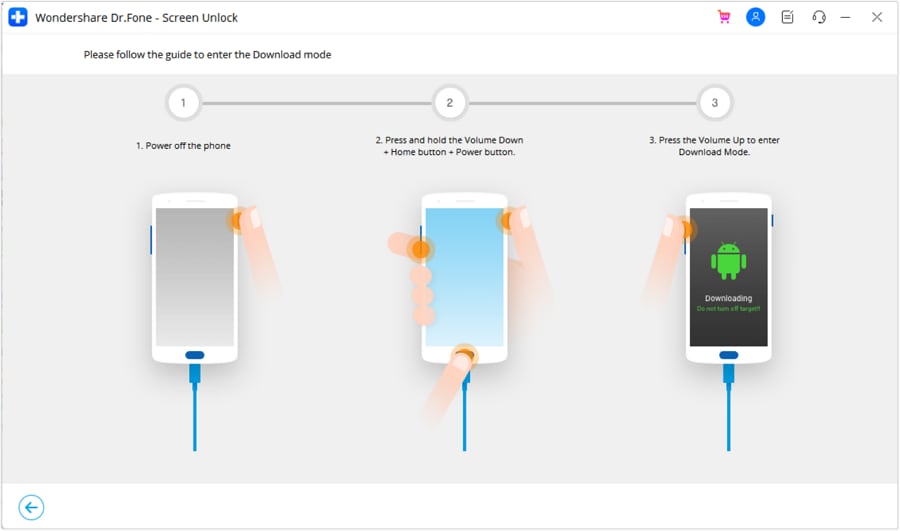
- Step 3: Initiate the Fingerprint Removal Process
After entering Recovery Mode, the screen unlocking procedure will initiate automatically. Please wait for the fingerprint removal process to finish. In case of failure, select “Try Again” to attempt unlocking again. Upon successfully unlocking your Android device’s screen, tap “Done.”
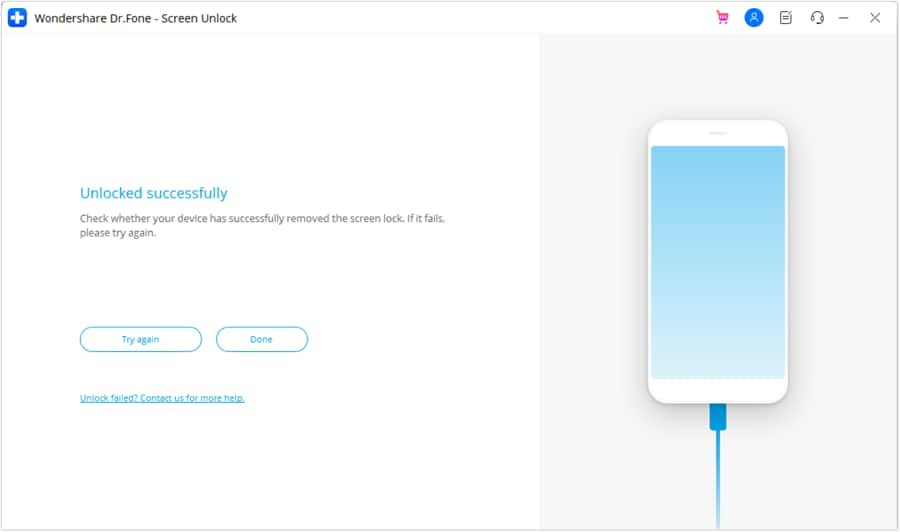
Part 2. 11 Conventional Solutions To Resolve Pixel Fingerprint Not Working
The solution above using Wondershare Dr.Fone is an effective and comprehensive method. It can tackle fingerprint recognition issues, but sometimes, users may look for simpler alternatives. We will explore conventional solutions that can address Pixel fingerprint problems. Each solution will also explain the underlying reasons for the Pixel 6 fingerprint sensor issue.
1. Fingerprint Sensor Not Touched Firmly
Problem
If the fingerprint sensor fails to recognize your fingerprint, it might be due to inadequate pressure. This could also be due to improper finger placement on the sensor.
Solution: Firm Placement
Ensure you firmly place your finger on the sensor, covering it entirely. Avoid too much pressure, but make sure the sensor fully contacts your fingerprint.
![]()
2. Device Showing Glitches
Problem
Glitches or software bugs in your Pixel device may cause disruptions. This can include issues with the fingerprint sensor’s functionality. These problems can range from minor issues to severe software glitches.
Solution: Restart Your Pixel Device
One of the easiest and simplest solutions is to restart your Pixel phone. You can do that by pressing the “Power” and the “Volume Up” keys. It will lead to a pop-up power menu where you must choose “Restart” to reboot your device.
![]()
3. Outdated Firmware
Problem
An outdated operating system or firmware can lead to compatibility issues. This can lead to malfunctioning features like the Pixel 6A fingerprint sensor not working.
Solution: Check for Updates
The best way to resolve this issue is to update your Pixel device. Having an outdated version of Android OS can lead to an accumulation of bugs and glitches. Moreover, it can seriously affect the OnePlus Open device’s performance, causing many issues. Here is how to check and update your Pixel phone:
Instructions. On your Pixel device, access the “Settings” app. Within Settings, scroll down to tap the “System” option. On the following screen, hit the “System update” option to check if any latest update is available. Here, if you see any updates, download and install them promptly. Before initiating the update, ensure your device is connected to a stable Wi-Fi network with sufficient battery charge.
![]()
4. Dirty Phone or Sensor
Problem
Accumulated dirt, dust, or residue on the phone or fingerprint sensor can cause obstruction. This can lead to the failure to properly recognize your fingerprint.
Solution
1. Cleaning the Phone
Employ a gentle, dry microfiber cloth for wiping down the complete surface of your Pixel device. Take particular care to thoroughly clean the region surrounding the fingerprint sensor. Refrain from utilizing rough substances or strong chemicals as they could potentially cause harm to the OnePlus Open device.
2. Fingerprint Sensor Cleaning
Gently wipe the fingerprint sensor area using a clean, dry cloth to ensure thorough cleaning. For better results, consider using a dampened cotton swab with water or isopropyl alcohol. Before using it again, ensure the sensor is entirely dry.
3. Compressed Air or Soft Brush
Use compressed air or a soft brush if there’s visible debris or particles around the sensor. Be cautious not to apply excessive pressure that might damage the sensor.
![]()
5. Screen Protector: Dirty or Damaged
Problem
A smudged or impaired screen protector might disrupt the working of the fingerprint sensor. This can potentially cause it to fail to recognize your fingerprint.
Solution
1. Clean the Screen Protector
Start by effectively cleaning the screen protector on your Pixel device. For a thorough cleaning, consider utilizing a screen cleaning solution. Ensure that the screen protector is free from any dirt or debris.
2. Replace Damaged Protectors
Is the screen protector visibly damaged, scratched, or peeling off? If yes, consider replacing it with a new one. Damaged protectors can hinder fingerprint recognition and compromise device protection.
3. Check Compatibility
Ensure the screen protector is designed to be compatible with fingerprint sensors. Some protectors may obstruct or interfere with the sensor’s functionality.
4. Remove Air Bubbles
There can be air bubbles trapped under the screen protector. If there are, gently press them out towards the edges using a card designed for this purpose.
![]()
6. Clean Your Finger
Problem
The problem may lie with your fingers rather than the OnePlus Open device. Unclean or moist fingers can hinder accurate fingerprint recognition on the sensor, causing the OnePlus Open fingerprint sensor to not work.
Solution
1. Cleanse and Dry Your Hands
Remove any dirt, oil, or moisture that might cause issues with the fingerprint sensor. It’s crucial to wash and thoroughly dry your hands. Additionally, verify that your fingers are entirely dry before engaging the sensor. The reason is any moisture or dampness may cause inaccuracies in fingerprint identification.
2. Avoid Oily or Greasy Substances
Refrain from touching oily or greasy surfaces before using the fingerprint sensor. These substances can transfer onto your fingers, affecting sensor accuracy. If your fingers are dirty or damp, pause to clean them using a dry, clean cloth.
![]()
7. Covering Screen if Fingerprint on Screen
Problem
Fingerprint marks or smudges on the screen might disrupt sensor functionality. This leads to inaccurate recognition when you try to unlock your device.
Solution
1. Avoid Covering the Sensor Area
Be cautious while cleaning the screen to avoid covering or smudging the area around the fingerprint sensor. Precise cleaning around this area prevents interference with sensor functionality.
2. Use Proper Holding Technique
While holding the OnePlus Open device, avoid placing your fingers or palms over the fingerprint sensor. Opt for holding the OnePlus Open device to minimize accidental contact with the sensor area.
![]()
8. Fingerprint Sensor Not Visible
Problem
Misconfigured settings on your Pixel device can lead to situations where the fingerprint sensor is not visible. It can lead to scenarios where the OnePlus Open device fails to recognize your screen unlocking attempt.
Solution: Adjust the Setting To Consistently Display the Sensor
You must adjust the display settings to ensure the fingerprint sensor is always visible. To do that, you can begin by opening the Settings app. Navigate to the “Display” tab and select “Lock Screen.” On the following window, toggle on “Always show time and info.”
![]()
9. Low Touch Sensitivity
Problem
The fingerprint sensor may have low touch sensitivity . It can lead to difficulties in accurately recognizing fingerprints, leading to OnePlus Open fingerprint not working.
Solution
1. Adjust Sensitivity Settings
Accessories like a screen protector might impact the performance of your Pixel device’s touch sensitivity. When using a screen protector, your Pixel enhances touch sensitivity. To do that, navigate to the Settings app and open it. Move to the “Display” window and scroll down to the last option. Toggle on the “Screen protector mode” to increase the screen sensitivity.
![]()
2. Finger Re-Enrollment
Delete existing fingerprints and re-register them. This re-enrollment can sometimes improve sensitivity and help remove the issues. Here is how you can delete and re-enroll your fingerprint:
- Step 1. In the Settings app of your Pixel, tap “Security & Privacy.” Then, press “Device Unlock” and choose “Fingerprint Unlock.” The device will now ask you to provide your device PIN or password.
![]()
- Step 2. Tap “Fingerprint Unlock” on the following screen and delete the previously enrolled fingerprints. Then, press “Add fingerprint” and follow the on-screen prompts to complete the process.
![]()
10. Other Hardware Issues
Problem
Persistent fingerprint sensor problems might indicate underlying hardware issues . This could go beyond common troubleshooting and might require professional help.
Solution
1. Inspect for Physical Damage
Thoroughly examine your Pixel device for any physical damage. These include cracks, dents, or scratches around the fingerprint sensor area. Physical damage could affect the sensor’s functionality.
2. Safe Mode Check
Boot the OnePlus Open device in safe mode to determine if third-party apps are causing conflicts. To do that, press the “Power” key with any volume key to access the power menu. Afterward, long-press the “Power Off” option until the “Reboot to Safe Mode” option appears on your device’s screen. Press “OK” to reboot into Safe Mode and test the fingerprint sensor’s functionality.
![]()
3. Professional Assessment
If you suspect hardware issues, seek professional help from authorized service centers. A clear sign of hardware issues can be visible damage or the sensor failing to function even in safe mode.
11. Factory Reset as Last Resort
Problem
Did all other troubleshooting methods fail to resolve persistent fingerprint sensor issues? Then, a factory reset might be required to revert the OnePlus Open device to its original settings.
Solution
1. Backup Data
Before initiating a factory reset, ensure that all crucial data is safeguarded. This encompasses contacts, photos, documents, and any other significant files. Use Google’s backup services or third-party apps to securely back up your data .
2. Initiating Factory Reset
Proceed with the following steps to execute a factory reset on your Pixel device:
- Step 1. On your Pixel smartphone, navigate to Settings and access the “System” tab. Here, scroll down to the bottom and tap “Reset Options.”
![]()
- Step 2. In “Reset Options,” choose “Erase All Data (Factory Reset)” to continue. Afterward, select “Erase All Data” on the next screen and follow the instructions to complete the process.
![]()
In summary, this article detailed various methods to fix the OnePlus Open fingerprint not working. Diverse approaches were explored, from simple steps like sensor cleaning to advanced solutions like factory resets. However, Dr.Fone stands out among these solutions as a top-tier option. It offers a secure and efficient resolution to the persistent problem of fingerprint failure on the OnePlus Open .
How to Lock Apps on OnePlus Open to Protect Your Individual Information
If you are not a fan of having to go through the process of getting through a pattern or password every time you want to use your phone, the good news is that you don’t have to. There are really just a few Apps on your Android device that have sensitive information you don’t want others getting access to. It would really be great if you could lock those apps individually as opposed to locking the OnePlus Open device as a whole.
Well, in light of helping you out, this article will address just how you can lock Apps on your device and not have to type in a code every time you want to use the OnePlus Open device.
Part 1. Why you need to Lock Apps on Android?
Before we get down to the business of locking some of your Apps, let’s look at some of the reasons why you would want to lock certain apps.
- You may simply want better access on your device. Locking certain apps will allow you to easily access the OnePlus Open device and use it without having to remember passwords and patterns.
- If you are a person who is not good at remembering passwords or patterns, simply locking certain apps will help you not get locked out of your entire device which can cause a lot of problems.
- If your device is used by more than one person, locking certain apps will keep the other users out of information you would rather they didn’t access.
- If you have children, you can eliminate the many accidental in-app purchases by locking the apps your children shouldn’t be on.
- Locking apps is also a good way to keep children from content they shouldn’t be accessing.
Part 2. How to Lock Apps in Android
There is always a good reason to Lock Apps on your device and we have two easy and effective methods you can use to do this. Choose the one that you are most comfortable with.
Method One: Using Smart App Protector
Smart App Protector is a freeware that allows you to lock specified applications.
Step 1: Download and Install Smart App Protector from the Google Play Store and Launch it. You may be required to install a helper application for Smart App Protector. This helper will ensure that the many App services running on your device will not be killed by third party apps.
Step 2: The default password 7777 but you can change this in the Password & Pattern Settings.

Step 3: The next step is to add apps to the Smart App Protector. Open the Running Tab on Smart Protector and tap on the “Add” button.

Step 3: Next, select the apps you would like to protect from the pop up list. Tap on the “Add” button once you have chosen your Apps.
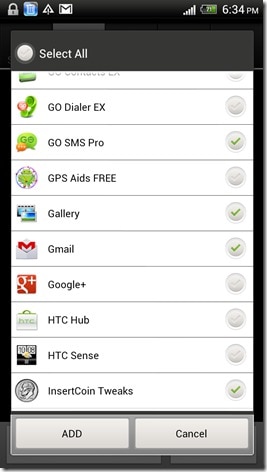
Step 4: Now close the app and the Apps chosen will now be password protected.

Method 2: Using Hexlock
Step 1: Download Hexlock from the Google Play Store. Once it is installed, open it. You will be required to enter a pattern or PIN. This is the lock code that you will use every time you open the app.
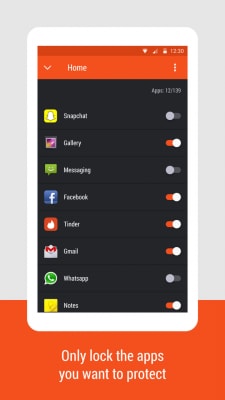
Step 2: Once the PIN or Password is set, you are now ready to lock apps. You can create multiple lists of Apps to be locked ba_x_sed on your different needs. As an example, we have chosen the Work panel. Tap on “Start Locking Apps” to start.
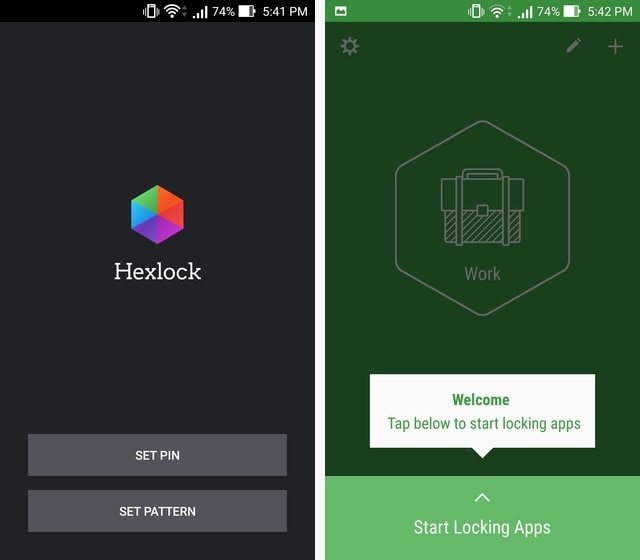
Step 3: You will see a list of Apps to choose from. Choose the Apps you wish to lock and then Tap the down arrow in the upper left when you are done.
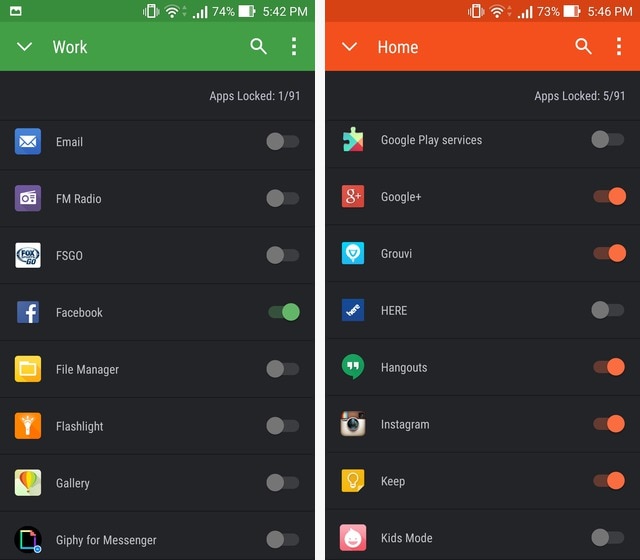
You can then Swipe to the left to move to other lists such as “Home” and proceed to lock apps in this group as well.
Part 3. 6 Private Apps that you should lock on your Android
There are certain apps that may require to be locked more than others. Of course the choice of which apps you should lock will depend on your own uses and preferences. The following are some of the apps you would like to lock for one reason or another.
1. The Messaging App
This is the application that allows you to send and receive messages. You may want to lock this app if you use your device to send messages of a sensitive nature that you would rather keep private. You may also want to lock this app if your device is used by more than one person and you don’t want other users reading your messages.

2. Email App
Most people use individual email applications such as Yahoo Mail App or Gmail. This is another critical one if you are going to protect your work emails. You may want to lock the email app if your work emails are sensitive in nature and contain information that is not for all individuals.

3. Google Play Services
This is the application that allows you to download and install applications to your device. You may want to lock this one if you are trying to prevent other users from downloading and installing further apps to your device. This is especially valuable if your device is utilized by children.
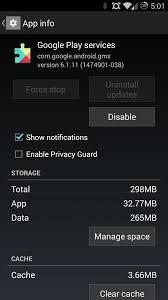
4. Gallery App
The Gallery app displays all the images on your device. The main reason you may want to lock the Gallery app may be because you have sensitive images that are not suitable for all viewers. Again this is ideal if children make use of your device and you have images that you would rather they didn’t see.
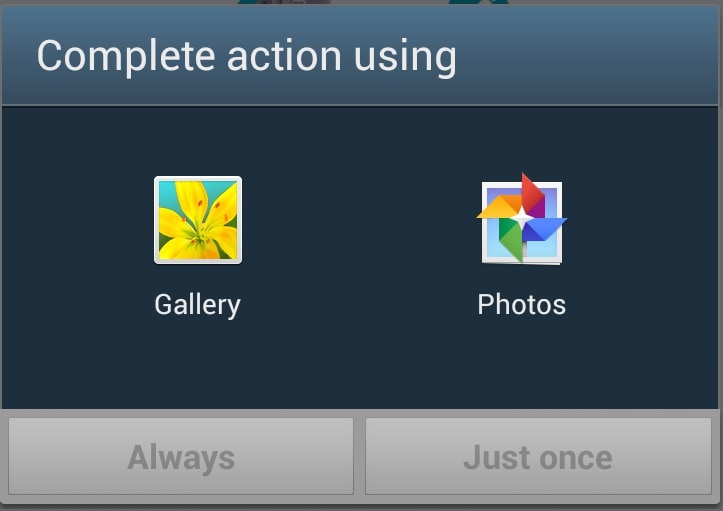
5. Music Pla_x_yer App
This is the Application that you use to play the music on your device. You may want to lock it if you don’t want anyone else making changes to your saved audio files and playlists or don’t want someone listening to your audio files.

6. File Manager App
This is the App that displays all of the files that are saved on your device. It is the ultimate app to lock if you have sensitive information on your device that you would rather not share. Locking this app will ensure that all of the files on your device will remain safe from prying eyes.

Having the ability to lock your Apps is an easy way to keep information out of the limelight. It also allows you to take full control of your device. Try it, it might just be freeing as opposed to locking your entire device.
Also read:
- [New] 2024 Approved Expert iPhone Macro Photography Tips and Tricks
- [New] Minecraft's Oriental Elegance 6 Top Ideas for 2024
- 2024 Approved Sonic Artistry and Video Prowess in Sony's Xperia XZ
- 7 Ways to Unlock a Locked Nokia C210 Phone
- Bypassing Google Account With vnROM Bypass For Poco X5 Pro
- Digiarty公式ブログ: DVDコピー専用情報 - 最新ガイド手順解説
- Effortless Techniques for Stunning Time Lapse Photography Using Samsungs for 2024
- How to Show Wi-Fi Password on Poco X5
- How To Unlock a Realme 11X 5G Easily?
- In 2024, How To Fix OEM Unlock Missing on OnePlus Nord 3 5G?
- In 2024, How To Unlock Poco C51 Phone Without Password?
- In 2024, The Updated Method to Bypass Motorola Moto G04 FRP
- Night Owls Rejoice: Unveiling the Features and Benefits of Barnes & Noble's Nook GlowLight 3 E-Reader
- Title: In 2024, How To Track IMEI Number Of OnePlus Open Through Google Earth?
- Author: Aaron
- Created at : 2024-10-22 19:16:52
- Updated at : 2024-10-27 17:32:41
- Link: https://easy-unlock-android.techidaily.com/in-2024-how-to-track-imei-number-of-oneplus-open-through-google-earth-by-drfone-android/
- License: This work is licensed under CC BY-NC-SA 4.0.